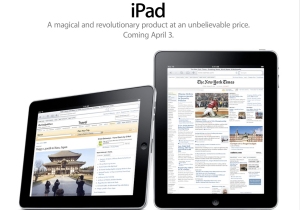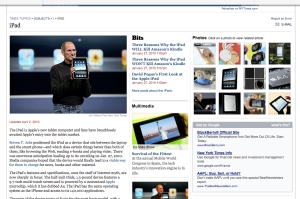Archive
NYTimes & iPad: A conflict of interest?
From the beginning, the relationship between The New York Times and Apple’s iPad could be characterized as cozy. However, looking back on the nuances of both Apple’s iPad marketing and the Times’ Apple coverage, one has to ask: What’s really going on here? At the very least, both companies seems to afford a number of favorable-coverage coincidences. At most, it could be a case of outright cooperation — just short of quid pro quo.
The following images were captured from www.apple.com:
Among all the rotating slides, The New York Times seems to be the only content displayed that isn’t an Apple application. Similarly, listen to this glowing review of The New York Times iPad application:
Apple seems to have been struck by Times fever, but then, Apple is a company. Companies regularly strike promotion agreements with each other. The more concerning question is: How will a purportedly independent news company deal with all this promotion?
Catching any bias in The Times’ coverage of the iPad takes more subtlety, and it’s difficult to tell if and when coverage might have been affected. However, there does seems to be a dearth of negativity surrounding the iPad, and surprisingly little coverage of Apple’s recent censorship of a German photographer’s website. One would think a media company looking to start a substantial distribution deal with Apple would be more concerned with the company’s stance toward censorship.
Macmillan's 'agency model' victory over Amazon = publisher pricing power?
The past couple weeks have been ripe with speculation over the new pricing model for e-books originally proposed by Apple: the “agency model.” The model would essentially give publishers power over the pricing of e-books instead of retailers like Amazon — a dream for publishers.
Well, the agency model could be more than a dream soon. Last month, publisher Macmillan demanded power over pricing in their dealings with Amazon, leading the key-market retailer to pull nearly all Macmillan titles from their store. But a few days later, Amazon reneged on their position, announcing that they would yield pricing power to the publisher — setting a ground-breaking precedent in the e-book retailer-publisher relationship. A week later, Hachette USA followed suit.
Summed up by IdeaLogical’s Mike Shatzkin, the agency model lets publishers sell directly to consumers with retailers acting as more of a cut-taking conduit.
“The ‘agency’ model is based on the idea that the publisher is selling to the consumer and, therefore, setting the price, and any ‘agent,’ which would usually be a retailer but wouldn’t have to be, that creates that sale would get a ‘commission’ from the publisher for doing so.”
This model would set a new standard for book pricing, giving more power to e-book publishers than in the current physical-book supply chain. Success would also provide a powerful incentive for publishers to promote the e-book market, particularly larger publishers that own the most titles (i.e. Random House, HarperCollins, Hachette Book Group, Simon & Schuster, Penguin, and Macmillan).
It remains unclear, however, how all this would work in reality. Would publishers keep and serve e-book files? What will the not-Amazon retailers do? How will smaller publishers with less leverage fit into the market? And most importantly for consumers, what will determine the price of an e-book?
For now, speculation reigns. Pricing power is a powerful weapon, but the model’s success ultimately rests with consumers, who must decide what an e-book is worth and whether publishers’ expectation of value matches it.
iPad an iReader?
Apple released the long-anticipated iPad last week to tremendous hype. From Apple fanatics to juvenile humorists, we all held our breath as Steve Jobs revealed the device that months of rumors had promised would be the end-all device and the new hip tool to tote around.
But as the tweets and blog reviews came to a boil, the blogosphere seemed decidedly mixed. Publications like Wired released a lists of problems that come down to the realization that Apple left so many features out of the iPad — not to mention compatibility with all those adapters — that many people viewed the devise as a huge step backward.
However — and here I’m getting to the meat of the story — there is one feature debuting on the iPad that struck me off guard: iBooks. Apparently, Jobs means for the new iPad to become a prominent e-reader device. With its larger, glossy screen and the new iBooks store (an iTunes-esque download store), the iPad could be in a great position to bring convenient e-reading to consumers. Of course, Apple insists the iPad offers much more than e-reading, but this striking feature has many publishers and news organizations drooling over possibilities.
Will the iPad work as an e-reader? Price is certainly an obstacle. Even the cheaper, wifi-only version will run consumers a cool $499, the G3 model $829. The extra price may be justified by the fact that, after all, the iPad is more than an e-reader. However, because the device can only run one application at a time, it might as well be just another e-reader while running iBooks.
Compatibility is another potential problem. Apple has cultivated an infamous reputation for locking users into proprietary hardware and software. I can only imagine the frustration of trying to transfer my downloaded e-books to another platform.
One thing the iPad has that Amazon’s Kindle and other competitors never quite grasped is the all-important cool factor. Owning the latest Apple gadget will always be a priority for some, and that market impetus may be enough to grab dominance.
In addition, many publishers seem eager to have their content associated with the iPad. Print news media in particular will be looking for a way to monetize content on a platform of users they suspect will be willing to put up with the extra expense. Of course, answers will have to wait until the official release date, April 2010, but that won’t stop speculation.


